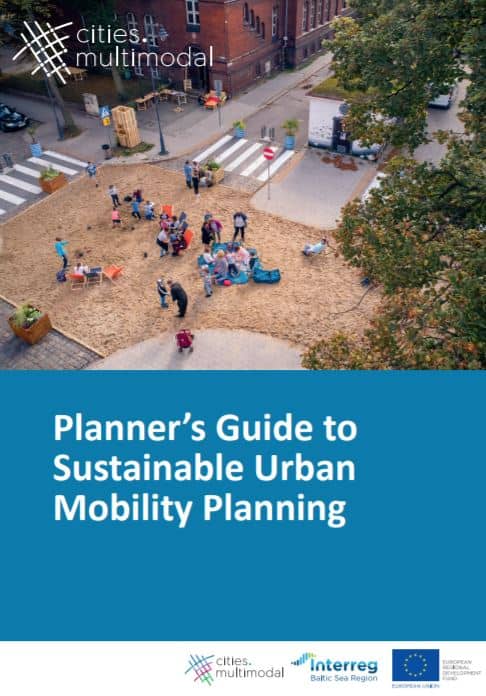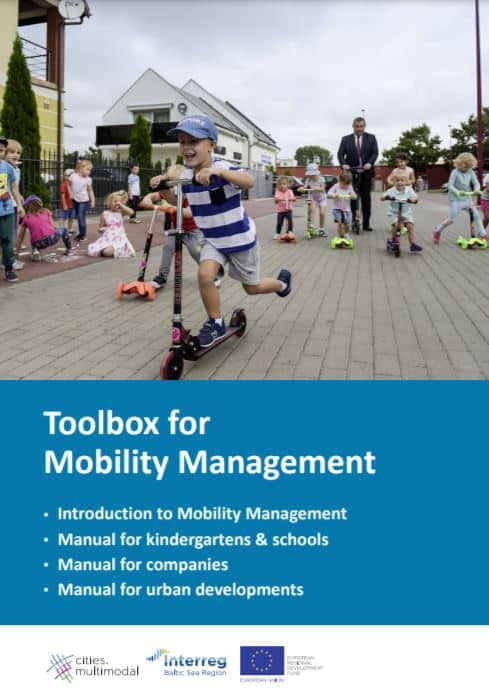cities.multimodal
In recent years multimodality in cities has become more integrated and more visible in city planning. New business models and modality modes are constantly emerging and triggering new decisions to be taken. As hubs for the economic development the cities are striving to provide citizens with easy, well-functioning and environmentally friendly transport options. At the same time, the cities and urban areas are facing concrete problems with ever-increasing congestion, growing CO2 emissions, noise caused by heavy car-traffic and accessibility problems partly as a consequence of missing intermodal links.
In order to upgrade multimodality, the cities need a collaborative approach by involving politicians, urban planners, public transport operators, industry as well as inhabitants. Targeted measures and better incentives for shifting from driving to more environmentally friendly alternatives would enhance multimodality and make it an integrated part of city planning process.
Budgets
in numbers
-
3.78MillionTotal
-
2.91MillionErdf
-
0.09MillionEni + Russia
-
0.00MillionNorway
Achievements
Incentives created
The project has successfully developed the sustainable urban mobility plans, established new mobility points, launched campaigns and introduced living street initiatives. Being driven by citizens, campaigns and living streets ensured stronger commitments and enhanced a better incentive structure. Visualization of how a city could look like in the future simplified understanding what could be done concretely. For 10 city partners, Rostock, Aarhus, Gdansk, Vilnius, Guldborgssund, Karlskrona, Pskov, Riga, Tartu, the multimodal city concept has become a reality.
Additionally, the project has enhanced mobility management in city quarters, schools and companies. Transnational collaboration among the participating cities resulted in a transfer of good practices. Thus, inspired by mobility points in cities like Ghent and Bremen, the participating cities got better insights into the process and found their own way through successful implementation.
Better guided and equipped
By developing guidance on sustainable urban mobility management and a handy toolbox with targeted solutions to concrete challenges, the project has provided the needed framework for public organisations like kindergartens, schools, as well as commercial and industrial companies. Aimed at enhancing institutional capacity, the supporting guide has provided better insights to the mobility mindset of the participating cities, the selection of pilot areas, planning approaches as well as the undertaken measures.
In addition, the project has evaluated the activities implemented within the project´s lifetime in order to show which measures had a major impact on successful implementation. The cities´ specific features were taken into consideration and a possible transferability of practices was accessed. Next, the project has also made multimodal travel planning analysis with a focus on web- and mobile-based travel planning applications. Based on market research, web-based applications and interviews, the analysis provided a comprehensive overview of ICT solutions tailored for different scenarios.
The Interreg project cities.multimodal used EUR 3.54 million from the European Union to find a more environmentally friendly way to driving and improving the citizens´ quality of life.
Outputs
Planner’s Handbook

Toolbox for Mobility Management
Multimodal travel planning analysis

Project Stories
-
08.02.2021
Encounters with passionate mobility managers
There's a story behind every project: a story of people from countries around the Baltic Sea who team up to exchange good practices or find a new way to tackle a joint challenge - together. In Interreg Baltic Sea Region, there are 140 such stories. And for the Managing Authority/Joint Secretariat staff, it is very rewarding to assist project partners from the moment their project idea starts to sprout to harvesting the achievements. Like in the case of the project cities.multimodal.Read full story -
07.04.2020
Interreg in audio: First episode of podcast "This is Europe" takes you to a greener Europe
As Interreg becomes 30, Interact has launched the production of an audio podcast this year. In fourty minutes you can travel across Europe, learn about great Interreg projects, and get to know other professionals who use Interreg to fulfil their missions. One of the projects presented is cities.multimodal in which people work towards greener mobility in cities - co-funded from our Programme.Read full story -
04.12.2019
What Russian partners do in Interreg projects: 5 examples from the Baltic Sea region
As many as 43 Interreg Baltic Sea Region projects are working together with Russian partners, showcasing that the same cause unites people beyond borders. From innovating businesses to saving energy and improving mobility – Russian partners are active in all thematic fields of the Programme. But what do they actually do?Read full story -
24.10.2019
What municipalities and cities get out of Interreg projects
Interreg is all about the regional development of municipalities and cities. Every tenth project partner in projects funded by Interreg Baltic Sea Region is a local public authority, i.e. an institution involved in governing a municipality or city. But why exactly do they participate in cooperation projects?Read full story
Partners
Hanseatic City of Rostock
- TownRostock
- RegionLandkreis Rostock
- CountryGermany
- RepresentativeSteffen Nozon
- Phone
- E-Mail
- Web
German Cyclist´s Association Schleswig-Holstein e.V.
- TownKiel
- RegionKiel, Kreisfreie Stadt
- CountryGermany
- RepresentativeCarsten Massau
- Phone
- E-Mail
- Web
Technische Universität Berlin, Center for Technology and Society
- TownBerlin
- RegionBerlin
- CountryGermany
- RepresentativeWulf-Holger Arndt
- Phone
- E-Mail
- Web
Municipality of Karlskrona
- TownKarlskrona
- RegionBlekinge län
- CountrySweden
- RepresentativeIda Heverius Löndahl
- Phone
- E-Mail
- Web
City of Kalmar
- TownKalmar
- RegionKalmar län
- CountrySweden
- RepresentativeRebecka Persson
- Phone
- E-Mail
- Web
Municipality of Aarhus
- TownAarhus
- RegionØstjylland
- CountryDenmark
- RepresentativePablo Celis
- Phone
- E-Mail
- Web
Riga City Council
- TownRiga
- RegionRīga
- CountryLatvia
- RepresentativeTimurs Safiulins
- Phone
- E-Mail
- Web
City of Gdansk
- TownGdansk
- RegionGdański
- CountryPoland
- RepresentativeKrzysztof Perycz-Szczepański
- Phone
- E-Mail
- Web
The Polish Union of Active Mobility
- TownGdańsk
- RegionGdański
- CountryPoland
- RepresentativeRafał Glazik
- Phone
- E-Mail
- Web
Vilnius City Municipal Government
- TownVilnius
- RegionVilniaus apskritis
- CountryLithuania
- RepresentativeAusra Siciuniene
- Phone
- E-Mail
- Web
Public transport department
- TownVilnius
- RegionVilniaus apskritis
- CountryLithuania
- RepresentativeGintarė Krušinskaitė
- Phone
- E-Mail
- Web
Tartu City Government
- TownTartu
- RegionLõuna-Eesti
- CountryEstonia
- RepresentativeJaanus Tamm
- Phone
- E-Mail
- Web
Union of the Baltic Cities Sustainable Cities Commission c/o City of Turku
- TownTurku
- RegionVarsinais-Suomi
- CountryFinland
- RepresentativeBjörn Grönholm
- Phone
- E-Mail
- Web
Institute of Baltic Studies
- TownTartu
- RegionLõuna-Eesti
- CountryEstonia
- RepresentativeMerit Tatar
- Phone
- E-Mail
- Web
Pskov City Administration
- TownPskov
- RegionPskov Oblast
- CountryRussian Federation
- RepresentativeKristina Kobyz
- Phone
- E-Mail
- Web
Guldborgsund Municipality
- TownNykøbing
- RegionVest- og Sydsjælland
- CountryDenmark
- RepresentativeOliver Klanert
- Phone
- E-Mail
- Web
-
Project managerSteffen NozonHanseatic and University City of Rostock, Mobility office Leader Mobility department
-
Legal representativeHolger MatthäusHanseatic City of Rostock
-
Financial managerBenjamin Techenteam red
-
Communication managerEsther KreutzUnion of the Baltic Cities




